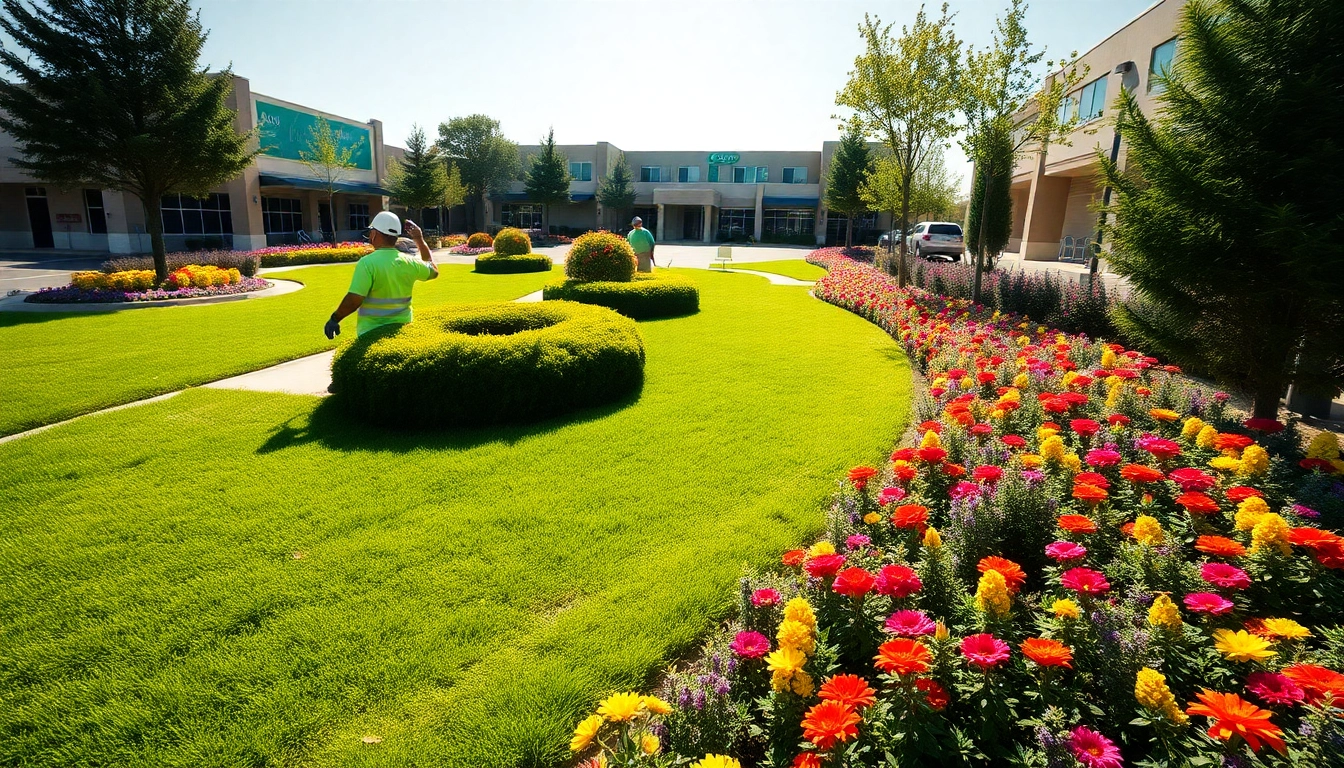Understanding the Role of Commercial Landscaping Contractors
When it comes to enhancing outdoor spaces, businesses often turn to commercial landscaping contractors. These professionals not only beautify properties but also contribute to their functional aspects, playing a critical role in property management. Let’s delve deeper into their encompassing role and the myriad of benefits they provide to businesses.
What Do Commercial Landscaping Contractors Do?
Commercial landscaping contractors specialize in designing, installing, and maintaining outdoor environments for various commercial properties, including office parks, retail centers, and industrial sites. Their duties often include:
- Site Evaluation: Assessing the land, understanding the local climate, and soil conditions to propose the best landscaping solutions.
- Design Services: Crafting designs that align with the client’s vision while considering practical factors like maintenance and sustainability.
- Installation: Executing the landscape design, which includes laying sod, planting trees and shrubs, and installing hardscapes like patios and walking paths.
- Maintenance: Offering ongoing services such as mowing, fertilizing, pruning, and pest management to keep landscapes healthy and visually appealing.
- Consultation: Advising clients on landscape improvements, native plant selections, and eco-friendly practices to maximize sustainability.
Key Benefits of Hiring Professionals
Hiring commercial landscaping contractors comes with numerous advantages:
- Expertise: Their training and experience enable them to handle the complexities of landscape management effectively.
- Time Savings: Outsourcing landscaping allows businesses to focus on core operations while professionals manage outdoor aesthetics.
- Sustainability Implementation: Professionals are often well-versed in sustainable practices, helping businesses lower their environmental impact.
- Increased Property Value: Well-maintained landscapes can significantly enhance a property’s curb appeal and overall value.
- Access to Resources: Contractors usually have access to better materials and technology, ensuring high-quality outcomes.
How They Enhance Aesthetic Appeal and Value
One of the critical aspects of a commercial landscape contractor’s role is enhancing aesthetic appeal.
Through thoughtful design and maintenance, they create engaging spaces that attract customers and clients. Additionally, a well-maintained landscape reflects a company’s professionalism, suggesting that it values quality in all aspects of its business. This not only helps in retaining current customers but also attracts new ones, ultimately driving sales and profitability.
Choosing the Right Commercial Landscaping Contractors
With many options available, selecting the right commercial landscaping contractor can be a daunting task. Here are vital considerations to help make an informed choice:
Factors to Consider When Selecting a Contractor
Several factors play a critical role in the selection process:
- Reputation: Research online reviews and testimonials to gauge the contractor’s reliability and quality of work.
- Scope of Services: Ensure the contractor offers a comprehensive range of services that meet your specific landscaping needs.
- Communication: Strong communication skills are essential, ensuring the contractor understands your vision and provides regular updates throughout the project.
- Licensing and Insurance: Verify that the contractor holds valid licenses and possesses liability insurance to protect your property and theirs.
Assessing Experience and Expertise
Experience can significantly influence the success of landscaping projects. Look for contractors who:
- Have a proven track record with projects similar to yours.
- Stay updated on the latest landscaping trends and technologies through continuous education.
- Employ certified landscape professionals, including designers, horticulturists, and arborists.
Evaluating Portfolio and References
Reviewing a contractor’s portfolio can give you insights into their design style, quality of work, and range of services. Request references and reach out to previous clients to inquire about their experiences:
- Did the contractor meet deadlines?
- Was the project completed within budget?
- How responsive was the contractor to questions or concerns?
Common Services Offered by Commercial Landscaping Contractors
While the specific services may vary by contractor, most commercial landscaping contractors offer a suite of standard services:
Lawn Maintenance and Management
Effective lawn maintenance consists of regular mowing, aeration, fertilization, and weed control. These services help ensure that the landscape remains healthy and attractive throughout the year:
- Mowing: Regular cutting helps maintain an even appearance and promotes healthy grass growth.
- Aeration: This process involves perforating the soil to allow air, water, and nutrients to penetrate, promoting root growth.
- Fertilization: Custom fertilization plans cater to specific grass types and soil conditions.
- Pest Control: Integrated pest management (IPM) strategies help control pests while minimizing harm to surrounding plants and wildlife.
Landscape Design and Installation
Commercial landscaping contractors bring creative vision to life through comprehensive landscape design and installation services, which may include:
- Design Concept Development: Developing unique design concepts that align with your brand image.
- Plant Selection: Choosing plants suitable for the climate, soil conditions, and expected foot traffic.
- Hardscape Installation: Installing walkways, retaining walls, and other non-plant elements that add functionality.
- Lighting Design: Integrating outdoor lighting to improve safety and highlight key landscaping features.
Irrigation and Water Management Solutions
Water management is a critical aspect of landscaping. Commercial landscaping contractors can install effective irrigation systems to ensure plants receive adequate moisture, which includes:
- Drip Irrigation: A highly efficient method that delivers water directly to the plant roots.
- Sprinkler Systems: Automated systems provide even coverage and can be programmed for specific times.
- Water Conservation Strategies: Implementing rain gardens, bioswales, or drought-resistant landscaping to minimize water use.
Budgeting for Commercial Landscaping Projects
Creating a budget for landscaping projects is essential to ensure the undertakings remain financially viable. Understanding cost structures can help you make informed decisions:
Understanding Cost Factors and Estimates
Several factors contribute to the overall costs of commercial landscaping, including:
- Project Size: Larger properties naturally require more materials and labor.
- Material Choices: High-quality plants and hardscape materials may come with a higher price tag but often lead to better long-term results.
- Labor Costs: Skilled labor generally costs more but delivers superior results.
- Maintenance Needs: Consider long-term maintenance costs when budgeting for landscaping.
Maximizing Value while Staying Within Budget
To achieve the best value for your landscaping investment, consider:
- Setting Priorities: Focus on areas that will have the largest impact on the property’s aesthetics and functionality.
- Phased Implementation: Opt for a phased approach, spreading project costs over multiple budgets while still achieving visual improvements.
- DIY Elements: If feasible, consider handling smaller tasks, like planting annuals, while leaving the more significant work to professionals.
Long-Term Financial Benefits of Professional Services
Investing in professional landscaping can yield significant long-term financial benefits, including:
- Increased Property Value: A well-maintained landscape increases the value of real estate.
- Operational Savings: Professional installations can reduce water usage and maintenance costs.
- Attracting Talent and Clients: A visually appealing landscape can enhance employee satisfaction and attract more customers.
Measuring the Success of Your Landscaping Projects
To truly gauge the effectiveness of your landscaping investment, it’s crucial to set measurable goals and evaluate success:
Setting Goals and Metrics for Evaluation
Establish clear objectives before starting the project, such as:
- Improving curb appeal.
- Enhancing guest experience.
- Reducing maintenance costs.
Determine appropriate metrics to assess progress towards these goals:
- Visual Aesthetics: Regular evaluations of plant health and layout effectiveness.
- Cost Analysis: Tracking expenses against your initial budget forecasts.
- Client Feedback: Surveying clients about their perceptions of the outdoor environment.
Client Feedback and Satisfaction
Gathering client feedback is crucial for understanding how effective your landscaping has been. Consider implementing:
- Customer surveys to assess satisfaction with landscape aesthetics and functionality.
- Regular check-ins with employees to gauge professional enjoyment of the outdoor spaces.
- Engagement with social media platforms for real-time feedback from customers and passersby.
Adjusting Strategies for Future Improvements
Evolving business needs may necessitate adjustments in your landscaping approach over time. Keep in mind:
- Regular Assessments: Schedule periodic evaluations to identify potential improvements.
- Stay Informed: Keep up with the latest landscaping trends and techniques to ensure you’re maximizing your environment’s potential.
- Engage Professionals: Work with your landscaping contractor to understand what changes can enhance the existing landscape.



